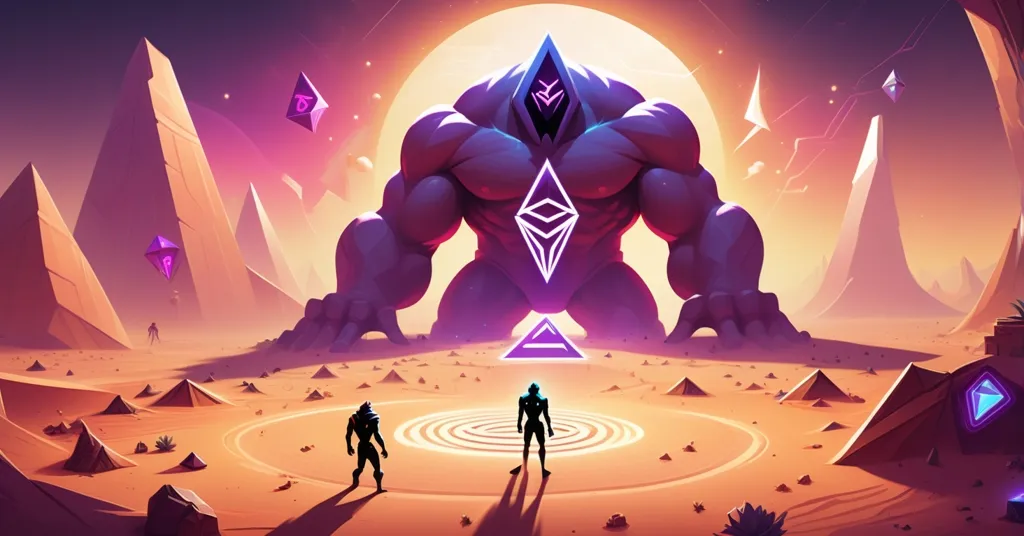Ethereum Stagnates as TAPZI GameFi Presale Sparks Buzz on BNB Chain

Ethereum Price Stagnates as TAPZI GameFi Altcoin Presale Gains Traction on BNB Chain
Ethereum is caught in a frustrating price limbo, unable to break key barriers, while a shiny new contender, TAPZI, is drumming up serious noise with its GameFi presale on the BNB Chain. As market capital pivots toward high-risk, high-reward altcoins, we’re dissecting whether this skill-based gaming project is a genuine disruptor or just another mirage in the crypto desert.
- Ethereum’s Struggle: Price stuck between $3,000 and $3,700 with no breakout in sight.
- TAPZI’s Buzz: GameFi presale launched at $0.0035 per token, pitched for massive long-term gains.
- Market Dynamics: Investors ditch large-caps for early-stage tokens chasing bigger returns.
Ethereum’s Stalemate: What’s Holding It Back?
Ethereum, the titan of smart contracts and decentralized finance (DeFi), is testing the resolve of its most die-hard supporters. After clawing back from a dip near $3,200, it’s now grappling with a stubborn resistance zone between $3,600 and $3,700. For the uninitiated, resistance is a price level where selling pressure often kicks in, blocking further upward movement. Buyers are twiddling their thumbs, hesitant to pile in without a clear signal or catalyst—like a major network upgrade or a surge in DeFi activity—to ignite a rally. On-chain data suggests reduced activity in sectors like NFTs and some DeFi protocols, while macroeconomic headwinds, such as rising interest rates dampening risk assets, aren’t helping either.
Let’s not forget Ethereum’s persistent challenges beyond just price charts. Gas fees, the cost of transactions on the network, remain a thorn in the side for smaller players despite improvements from layer-2 solutions—secondary networks like Arbitrum and Optimism built to make transactions cheaper and faster. Competition from other layer-1 blockchains like Solana, often touted for lower costs and faster speeds, continues to siphon off developers and users. Ethereum’s fundamentals in DeFi and NFTs are still rock-solid, but with no immediate spark to drive momentum, ETH holders are left watching paint dry while capital flows elsewhere.
Market Shift: Chasing the Next 100x
This stagnation in Ethereum mirrors a broader market trend where investors are growing restless with large-cap altcoins. When giants like ETH move sideways, speculative money often seeks out riskier bets with the potential for outsized gains. Enter the world of early-stage tokens and presales, where promises of 100x returns can dazzle even the most cautious traders. This isn’t new—crypto markets have always been a playground for thrill-seekers, and with Ethereum looking sleepy, projects like TAPZI are stealing the limelight as the latest shiny object.
TAPZI: Hype or Hope in GameFi?
Before we dive into TAPZI’s details, a word of caution: the glowing narrative around this project stems from sponsored content, meaning someone’s paid to hype it up. That doesn’t make it a scam outright, but it does mean you should approach with the wariness of a Bitcoin maximalist sniffing out an altcoin pitch. Now, let’s unpack what TAPZI brings to the table.
Launched on July 22, 2025, at a presale price of $0.0035 per token, TAPZI is a GameFi project on the BNB Chain—a blockchain known for its low fees and fast transactions, making it a popular choice for gaming and DeFi apps. GameFi, short for gaming and decentralized finance, merges play with earning opportunities, letting players snag crypto rewards through gameplay. TAPZI’s hook is skill-based gaming, offering classics like Chess, Rock-Paper-Scissors, and Checkers where outcomes hinge on player ability, not luck or pay-to-win mechanics that have soured many on other gaming tokens. For deeper insights into why TAPZI is gaining traction as a promising altcoin, check out this detailed analysis on TAPZI’s potential for long-term gains.
What’s intriguing about TAPZI is its tech setup. It uses a hybrid off-chain/on-chain system, meaning gameplay happens off-chain for speed—think instant moves in a chess match—while rewards and outcomes are recorded on-chain for transparency and security. They’ve also built in anti-cheat mechanisms to tackle bots and exploits, a notorious issue in competitive gaming. Details on how this anti-cheat tech works are sparse, though, and without real-world testing, it’s hard to gauge if it’s more than a marketing buzzword. For now, let’s just say it addresses a real pain point, even if the proof is pending.
The presale numbers are turning heads, though they smell a bit too polished. With 20% of the total token supply available now, over 70% has reportedly been sold. Another 20% is set aside for liquidity at launch, with a listing price of $0.01—a neat bump from the presale figure. The fully diluted valuation at launch, or the total market cap if all tokens were in circulation, is pegged at $50 million, with projections floating a rise to $200 million if adoption surges and milestones are met. Compare that to Axie Infinity, a GameFi giant that hit a $10 billion valuation at its 2021 peak, and TAPZI’s numbers seem modest—but also wildly speculative for an unproven project. Tokenomics-wise, allocating 40% of supply to presale and liquidity raises eyebrows; it could stabilize price at launch, or it could set the stage for early dumps if insiders cash out.
TAPZI’s roadmap is ambitious, bordering on fantasy. They’re targeting a beta platform release in Q4 2025 with staking options and ranked matches, a mobile app alpha in the same quarter, and NFT integrations for in-game items like custom pieces or skins by Q1 2026. NFTs, for the unversed, are unique digital assets representing ownership of virtual goods. Sounds great, but the NFT market has been a rollercoaster, with interest cooling off after the 2021-2022 hype. If that trend continues, this feature could fizzle. Plus, crypto gaming development is notorious for delays—can TAPZI really deliver on this tight timeline? History says don’t bet the farm on it.
On transparency, TAPZI claims a win: the team has completed KYC (Know Your Customer) verification with a Tier 1 launchpad and auditing partner, and public docs are available. That’s a step up from the faceless dev teams behind many presale disasters, but audits aren’t foolproof, and KYC doesn’t stop a rug pull if the intent is there. It’s a checkbox, not a guarantee.
Buyer Beware: The Presale Pitfalls
Let’s cut through the fog with some harsh reality. The crypto space is a graveyard of presale projects that overpromised and underdelivered. Remember Bitconnect, the 2017 lending platform hyped as a surefire winner? It collapsed in a spectacular Ponzi scheme, wiping out billions in investor funds. Or take the countless ICOs (Initial Coin Offerings) from the same era—most vanished into thin air. GameFi isn’t immune either; post-Axie Infinity, copycats like StepN lured players with “move-to-earn” gimmicks, only to crash when the economics proved unsustainable. TAPZI might be different, but the odds aren’t in its favor—stats suggest over 90% of new tokens fail within a year.
Beyond project-specific risks, GameFi faces regulatory heat. Some governments view crypto gaming as akin to gambling, especially with earn mechanics, and have cracked down with loot box laws or outright bans. If TAPZI gains traction, it could attract unwanted scrutiny, derailing its plans. Then there’s the broader altcoin investment risk: volatility. Presales are a gamble—tokens can tank post-launch if hype fades or markets turn bearish. If you’re eyeing TAPZI, treat it like a lottery ticket, not a retirement plan.
Bitcoin’s Lens: Altcoins as Experiments
As someone with a Bitcoin maximalist streak, I’ll admit I view most altcoins with a raised eyebrow. Bitcoin remains the gold standard of decentralization and a true store of value, while many altcoins scramble for relevance with flashy use cases. Yet, I can’t ignore that platforms like Ethereum—and by extension, projects like TAPZI on BNB Chain—tackle niches Bitcoin doesn’t touch. Complex smart contracts and application-specific ecosystems like Web3 gaming are outside BTC’s wheelhouse, and that’s fine. Bitcoin doesn’t need to be everything to everyone; it’s the bedrock, not the sandbox.
Still, there’s something to admire in TAPZI’s attempt to disrupt traditional gaming, where centralized giants rake in billions while players get crumbs. Skill-based GameFi, if executed well, could empower users with ownership and earnings in a way that aligns with decentralization’s ethos. It’s a long shot, sure, but as a fan of effective accelerationism, I’m all for tech that shakes the status quo—even if it’s a messy, risky ride. Just don’t expect me to trade my sats for TAPZI tokens anytime soon.
Key Takeaways and Questions on Ethereum and TAPZI
- Why is Ethereum’s price stuck in a rut?
ETH faces resistance at $3,600-$3,700, with cautious buyers awaiting a catalyst. Reduced on-chain activity and macro pressures like rising interest rates are also weighing it down.
- What’s fueling interest in TAPZI over giants like Ethereum?
Investors are chasing higher returns in early-stage tokens like TAPZI as large-caps show sluggish growth, despite the glaring risks of presales.
- How does TAPZI stand out in the GameFi space?
Its focus on skill-based games, a hybrid off-chain/on-chain model for speed and transparency, and anti-cheat systems aim to prioritize fairness over luck-driven or pay-to-win setups.
- Is TAPZI a solid GameFi investment for 2025?
Not without heavy due diligence. The sponsored hype, untested tech, and high failure rate of presale projects scream caution over blind excitement.
- Does Ethereum’s lull signal trouble for large-cap altcoins?
Not necessarily. Consolidation is normal, and ETH’s role in DeFi and NFTs remains unmatched, even as capital chases riskier bets.
- How does GameFi like TAPZI differ from traditional gaming?
Unlike centralized games where companies control everything, GameFi uses blockchain to let players earn crypto and own digital assets, though sustainability and fairness vary wildly by project.
Ethereum’s current snooze-fest is a stark reminder that even the biggest players can hit a wall, while the market’s hunger for novelty keeps underdogs like TAPZI in the glare of speculation. If you’re tempted by this GameFi presale, play it like a high-stakes poker hand—only wager what you’re fine with losing, and don’t fall for the siren song of “easy gains.” As for Ethereum, patience might pay off when the next big move finally hits. In crypto’s untamed frontier, one question looms: Will TAPZI emerge as the dark horse of 2025, or just another forgotten name in the shadow of Ethereum’s enduring dominance?



